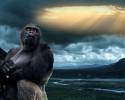Book Review - God- or Gorilla?, Chapter 17
This entry is part of a series. For a bit of an introduction and an index of all entries in the series, go here.
 This installment covers Chapter 17, Psychical Activity.
This installment covers Chapter 17, Psychical Activity.
Here we see what might be a precursor of the now common entropy argument.
Natural science compels us to assume certain formal principles, which are not makeshifts meddling with material energy, nor do they disturb the permanence of the law of energy; they simply direct the lower energy, quicken to life the atoms hitherto dead by absorbing them into the organism and, in short, effect THE PURPOSE of the vital processes by action from within. This postulate is eminently reasonable - I personally cannot dispense with it, and should not be able to dispense with it, even if theology did not exist. (McCann 214)
There's all the talk of energy that creationists now like to bring up when discussing the Second Law of Thermodynamics, but this could just be vitalism. Now I wonder if vitalism somehow influenced the Second Law canard, or if it's just a matter of trying to sound 'sciencey' by talking about energy.
Then we get the 'evolution says we're nothing but chemicals' complaint.
But, according to the latest theories of the materialistic evolutionist, as announced at the Second International Congress of Eugenics, American Museum of Natural History, New York City, September, 1921, it is not the soul that distinguishes man from the ape, but rather a physical difference brought about by the action of the endocrine glands, the secretions of which are responsible for the development of man from the ape. Dr. Charles B. Davenport, director of the Eugenics Record Office, says that all crimes and all moods are produced by various chemicals called hormones, which are manufactured by the different glands and poured into the blood stream which carries them to the different organs, including the brain, where they produce profound bodily and mental effects. (McCann 216)
We now have the benefit of nearly a century's worth more research, and it's very clear that our brain chemistry affects our moods and actions. The most common example is alcohol, but there are also the new drugs used to treat depression, ADHD, and other aspects of personality.
In fact, the more we learn about the brain, the more superfluous souls become. Go read Ebon Musing's article, A Ghost in the Machine, for lots of good examples of how our material brain is sufficient to explain our personalities.
After mentioning a hypothesis that perhaps meat eating gave our ancestors the extra energy needed to develop larger brains, McCann again demonstrates the misconception of a ladder of progress.
Dogs, cats, wolves, hyenas, lions, tigers, vultures and other carnivorous creatures have been eating meat for thousands of years, and doubtless in time will more fully develop the distinctively human factors which even now, due to a meat diet, must be well advanced, though unobtrusively so, on their way to the human stage. (McCann 218)
We are a very rare animal. It took a very specific set of circumstances to come together to lead to our evolution. It wasn't simply eating meat that transformed our ancestors into humans. That was only one requirement (which gave us the calories for our big, energy intensive brains). With how much energy (i.e. food) big brains require, it takes a specific type of environment where the advantages offset the disadvantages (for us, it appears to have been for social reasons). But even just being smart isn't going to make a human. Look at dolphins and elephants. They're pretty damn smart, too.
From our modern perspective where humans dominate the planet, we don't realize how precarious our survival was in the past. There's some evidence that we nearly went extinct 70,000 years ago. There was a fair amount of luck in our lineage surviving, and but for a disease outbreak at just the wrong time, I might not be sitting at a computer writing this, and you wouldn't be reading it. In other words, there's nothing driving evolution to produce human like animals.
Here we get two misconceptions for the price of one - evolution can't produce new information, and evolution can't explain a subjective experience.
It would be difficult following William Bateson's dictum, "An organism cannot pass on to its offspring a factor which it did not itself receive in fertilization," to attribute the music faculty of man's soul to the seed of an ape...The evolutionist who says there are no miracles is confounded by the miracle of music and made dumb by speculation concerning its origin. (McCann 219)
I'll cut McCann a tiny bit of slack in the first claim. Genetics wasn't as well understood then as it is now, so mutation wasn't understood. But now, of course we know that children can pass on genetic information that they didn't receive from the parents. I've already covered all this in previous entries in this series, but just to repeat, current estimates for human mutation rates are around 100 mutations per individual. And I'll once again link to information on Richard Lenski's experiment, where e. coli developed mutations that gave them the ability to digest a new food source (citrate), as an example of how random mutations can result in new functions. I'll also link to an article by Richard Dawkins, The Information Challenge, which explains the processes of how information can be added to the genome.
